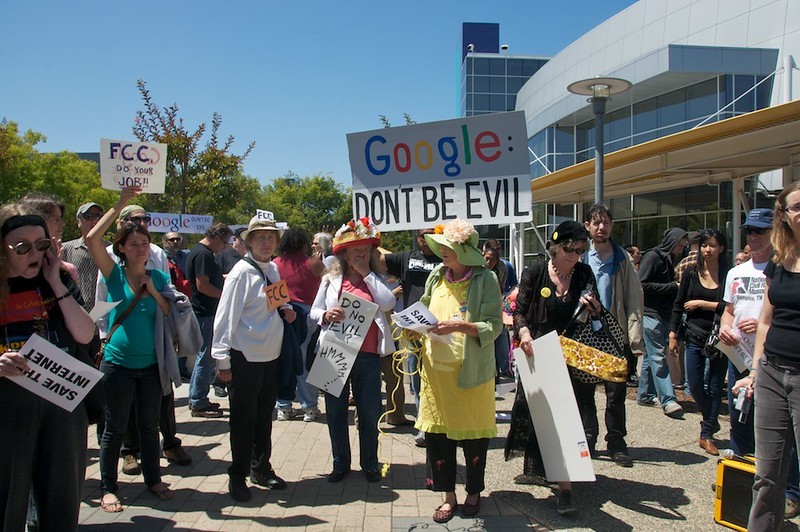The events of recent months contain many lessons for popular political movements in the future. In the age of COVID-19, much of American politics has migrated from “real life” onto the internet (which is just as real). More than ever, it is becoming clear that populist movements of either the left or the right—or some combination thereof—must seek to reclaim control of the digital network, which now constitutes a substantial part of the political and economic infrastructure of the neoliberal order. Populism must find some way to develop a form of technocratic expertise if it is to have any hope of controlling the digital network. In other words, as the Marxist scholar Edmund Berger has written, populism must become technopopulism.
A Big Tech Coup d’Etat
The 2020 election revealed Trump’s most formidable enemies to be, not the Democrats who sit in the Senate or the House of Representatives, but the CEOs of major corporations of Silicon Valley. As election season approached, the political motives of these tech lords–and the extent of their power–began to emerge more clearly. When the New York Post published an article detailing evidence of corruption in the Biden family, social media companies like Twitter and Facebook responded with shameless censorship, making clear whose “side” they took in the coming electoral battle. When the election itself finally came in November, and Trump began to make accusations of election fraud, the tech giants didn’t hesitate to fact-check his claims on Twitter, Facebook, Instagram, and so on.
Yet the most striking and unprecedented act of coordinated censorship came in the wake of the assault on Capitol Hill. The images of crazed Trump supporters, in MAGA hats and theatrical costumes, overwhelming the police and forcing their way into the Capitol, shook the nation. The riot was the escalation of a massive protest that Trump himself had arguably encouraged (without explicitly calling for any violence), with the intention of pressuring Congress into rejecting the election results. It failed miserably, though not without many injuries and several deaths.
The media immediately characterized the whole event as an attempted coup d’etat. Trump had clumsily given them the perfect reason to portray him as the fascist villain they have always claimed he was; an instigator of violence, a threat to American democracy. Suddenly, the tech companies could seize the opportunity to discredit and disempower him, with an apparently good reason to do so. Thus, they went in for the kill, banning him on practically every major social media platform. Donald Trump, still the sitting President of the United States, was now completely disabled from making his Presidential voice heard in America’s public sphere. Nominally still in office, he was no longer in power.
This was the real coup: a technological coup—one accomplished behind the scenes by the omnipotent technocrats who manage the digital network that is effectively America’s commons.
While the Russian government was preoccupied with Lenin’s proletarian army, Trotsky took control of the entire public infrastructure and threw the government’s communications abilities into total disarray.
There is an unexpected parallel to this event in history. While Trump himself was once described as a “right-wing Leninist” on the front page of the New Statesman, there is a case to be made that the true imitators of the October Revolution are the enemies of Trump, who are especially represented by Big Tech. In a book on Bolshevik tactics entitled Technique du Coup d’Etat, the Italian communist Curzio Malaparte once observed that the success of the revolution owes less to Lenin than it does to Trotsky: the man who single handedly organized a technological coup on October 25, 1917. Malapartre demonstrates that it was not just Lenin’s mass proletarian mobilization, and the armed storming of the Winter Palace, that brought the government to heel, but Trotsky’s occupation of the public infrastructure with less than a thousand of his proletarian technicians. Trotsky’s tactics involved the targeted occupation of public utilities such as the railways, telegraph office, telephone office, postal office, electricity plants, etc.—in other words, the social communications media of the day. Thus, while the Russian government was preoccupied with Lenin’s proletarian army, Trotsky took control of the entire public infrastructure and threw the government’s communications abilities into total disarray.
The parallels between this event and Big Tech’s coup d’etat against Trump are striking. As the Slovenian Marxist philosopher, Slavoj Zizek, has remarked (commenting on Malaparte’s account of the October Revolution), today’s equivalent of the old Russian infrastructure that Trotsky occupied is none other than the digital network. Thus, it is the digital network that ought to be the primary locus and target of revolutionary activity. Big Tech’s coordinated censorship of Donald Trump, as well as a number of other high-profile “conservative” voices, is nothing if not a resounding confirmation of Zizek’s observation.
There is, however, a major difference between the two events: Trotsky’s coup was a proletarian revolution; the latest Big Tech coup was a reactionary bourgeois counterrevolution. That is, Trotsky’s technical coup was part of a popular uprising, a proletarian strike against the ruling class, while the interventions of Big Tech—though similarly directed against the government—was made by and on behalf of the capitalist elite, against what it perceived as the threat of a popular uprising. Indeed, it is not implausible to imagine the public infrastructure provided by Big Tech being weaponized more aggressively against the popular classes, the effects of which may be too great and terrifying to even imagine.
It is for this reason that Zizek has often come to the defense of whistleblowers like Julian Assange or Edward Snowden, who have brought to light the radical monopolization and alienation of the digital space by an opaque and centralized bureaucracy. Zizek himself, of course, does not oppose centralized bureaucracy as such; yet he sees the enclosure of the digital commons—often intended to keep state-sanctioned violence and capitalist exploitation out of the public eye—as a deeply problematic facet of the capitalist state. Accordingly, whistleblowers like Assange or Snowden stand for the interests of ordinary people, who have been deprived of the means to build class consciousness, bonds of solidarity, and collective action by a technocratic state apparatus that keeps them under constant surveillance and the threat of censorship.
None of this is meant to imply that Donald Trump somehow represented the true interests of the working class. And it is not at all clear that the post-Trump GOP will meaningfully take on the mantle of the “workers’ party.” Rather, the point is that the locus of techno-capitalist power is in the digital network, and it is controlled from behind the scenes by a small group of extremely powerful people. Essentially, the online sphere is the contemporary battlefield of the class struggle.
Technopopulism on Wall Street
The digital network constitutes not just the public political infrastructure but also financial activities—the control of prices, the distribution of wealth, the maintenance of inflation, etc.—that take place at the heart of American capitalism. Here too, it is the site of class struggle. A recent example has emerged from deep within the delirious caverns of the internet, sending shockwaves through Wall Street. I am, of course, referring to the now famous “GameStop” (GME) affair, which has widely been hailed as a “populist” uprising against the finance industry.
The populists in question were a large group of anonymous retail investors and Reddit users, concentrated in a sub-Reddit forum called wallstreetbets. This band of internet misfits discovered that a major hedge fund on Wall Street, Melvin Capital, was in a position to short-sell the stock of a failing video game company whose stock had fallen to a price of about $5 per share. (Journalists have speculated that many of these Redditors were themselves gamers since childhood, who saw Melvin’s short position as an assault on something they value—so they retaliated.) In droves, they began to buy up GameStop shares, sending the price up from $18 to $347 in an unprecedented two days, eventually forcing Melvin Capital, one of the wealthiest hedge funds on Wall Street, to give up its short positions with losses up to 53%.
In the meantime, several of these anonymous investors, many of them poor or in debt, suddenly found themselves wealthy. Stories circulated about how a few of them had cashed out a fortune, and some were at last able to afford important medical bills, pay off debt, or buy a new home. Some saw themselves as getting sweet revenge on Wall Street for the hardships into which their families were plunged during the 2008 financial crisis. This was a day of reckoning. This was a populist revolution.
What was unique about this particular instance of populist uprising was that it possessed an unusual level of technical competence that allowed it to manipulate one of the most technocratic digital institutions in the world, to the great dismay of the financial elite. This was no ordinary, ineffectual populism; it was technopopulism.
The GameStop revolt will probably not have a permanent effect on the social structures of neoliberal capitalism. However, it undoubtedly came much closer to posing a real threat to Wall Street than anything ever achieved by the Occupy Wall Street movement or by the rise of populist politicians like Donald Trump or Bernie Sanders. The reason why it came so much closer to success is that it was, in some small way, a technical revolution, one which shook the digital foundations of the economic edifice of financial capitalism. The Reddit populists offered the world a glimpse of what possibilities lie ahead (granted, still far ahead) for a revolutionary movement that takes the cyber network as its principal target.
The forces that prevented the GameStop populists from bringing their Wall Street opponents to heel are similar to those which silenced Donald Trump. It was not long before several platforms based both in Silicon Valley and in Wall Street made GME and other similar stocks unavailable to day traders and shut down the online forums where the rogue investors had been communicating.
As Zizek has advised, the sheer scale of today’s challenges requires that we begin to think more carefully about alternatives. If populism is ever to succeed, it must resist the activist impulse to occupy Wall Street or storm the Capitol. Instead it must fight the technocrats on their own turf and permanently occupy the centers of their power. This is a much longer game than can be played by a handful of retail investors, yet the GameStop populists have charted a path forward. The populism of the future must develop and organize its own technocratic expertise, with a view to making the “long march through the institutions” of the neoliberal technocracy.









